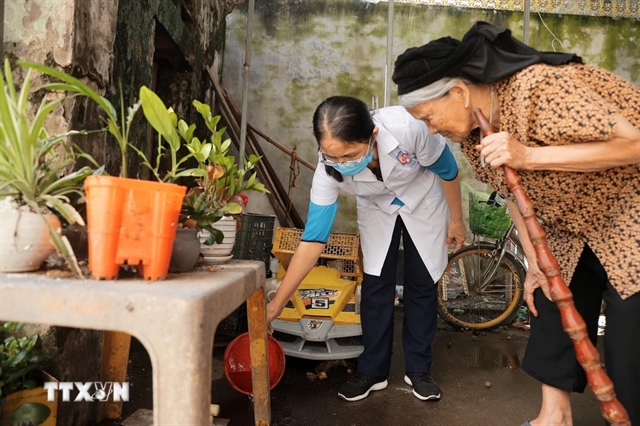Vaccine can effectively solve dengue fever problem in Việt Nam, experts say
Society – Economy - Ngày đăng : 13:54, 04/12/2024
 |
| Experts attended the workshop in Hà Nội on December 3. — Photo VGP |
HÀ NỘI — Vaccines can effectively address the dengue fever problem in Việt Nam, health experts said at a workshop in Hà Nội on December 3.
The event titled 'Preventing dengue fever - What are the effective measures?' was organised by the Việt Nam Government Portal.
Speaking at the workshop, Hoàng Minh Đức, director of the Department of Preventive Medicine under the Ministry of Health, said that dengue fever is a disease for which there is no specific treatment, although a preventive vaccine is available.
“Dengue fever is not simple to control. Previously, there was no specific treatment or vaccine, so dengue fever prevention and control were mainly accomplished through vector control and symptomatic treatment,” said Đức.
According to Đức, Việt Nam is currently seeing the circulation of two diseases that are of great concern for epidemic prevention: hand, foot and mouth disease and dengue fever.
Each year, Việt Nam reports nearly 200,000 dengue cases and nearly 100 deaths, many of which are children, resulting in a significant economic burden. In 2023, the health sector reported more than 40,000 cases of dengue fever in Hà Nội alone. So far this year, Hà Nội has reported more than 7,000 cases.
The Vietnamese Government has recognised that dengue fever prevention and control is not just a problem for the health sector, but requires the participation of the entire political system. This requires coordinated participation at all levels, sectors, and socio-political organisations, as well as society as a whole.
The health official noted that dengue prevention and control was previously included in the National Target Programme, but this programme ended in 2020.
“After the programme ended, according to the Budget Law, the Government required localities to allocate a budget for dengue prevention and control. When there is no specific programme and no vaccine, communication and direction activities can still help reduce cases. But in recent years, dengue fever has almost returned," stressed Đức.
 |
| A health worker instructs people to prevent dengue fever in the community. —VNA/VNS Photo Minh Quyết |
Experts said that there is currently no specific treatment for dengue fever. A vaccine to prevent the disease is now available but is not widely used in Việt Nam. Prevention and control of dengue fever thus far have relied mainly on vector control and changes in people's behaviour and habits.
"Up to now, vaccines have always been the most effective weapon in the prevention of infectious diseases. Of the 58 infectious diseases, there are currently more than 40 diseases that have vaccines," Đức said.
"The dengue fever vaccine was licensed in Việt Nam in May 2024. This vaccine is currently being included in the vaccination service programme and people have to pay for it themselves. The vaccine is very effective and can solve the problem of dengue fever prevention in Việt Nam," he noted.
According to Professor Vũ Sinh Nam, Senior Advisor on Dengue Fever at the National Institute of Hygiene and Epidemiology, vaccination must still be carried out in parallel with measures to kill mosquitoes and larvae to ensure sustainability.
“The WHO's strategy also instructs that in addition to using vaccines, vector prevention cannot be neglected. In addition, it is necessary to educate and raise community awareness about preventing the disease with vaccines and to actively participate in removing waste items, killing larvae and mosquitoes in households to ensure long-term effectiveness,” said Nam.
“In addition, we must continue to monitor and update information on dengue fever and be ready to detect signs of outbreaks early to take integrated measures such as vaccines and vector eradication to eliminate the epidemic quickly and effectively,” Nam added.
According to the WHO, the number of dengue cases globally has doubled each year since 2021, with more than 12.3 million cases as of the end of August 2024 — almost double the 6.5 million cases reported in all of 2023. There are an estimated four billion people at risk of mosquito-borne diseases worldwide, with this number expected to increase to five billion by 2050. — VNS
